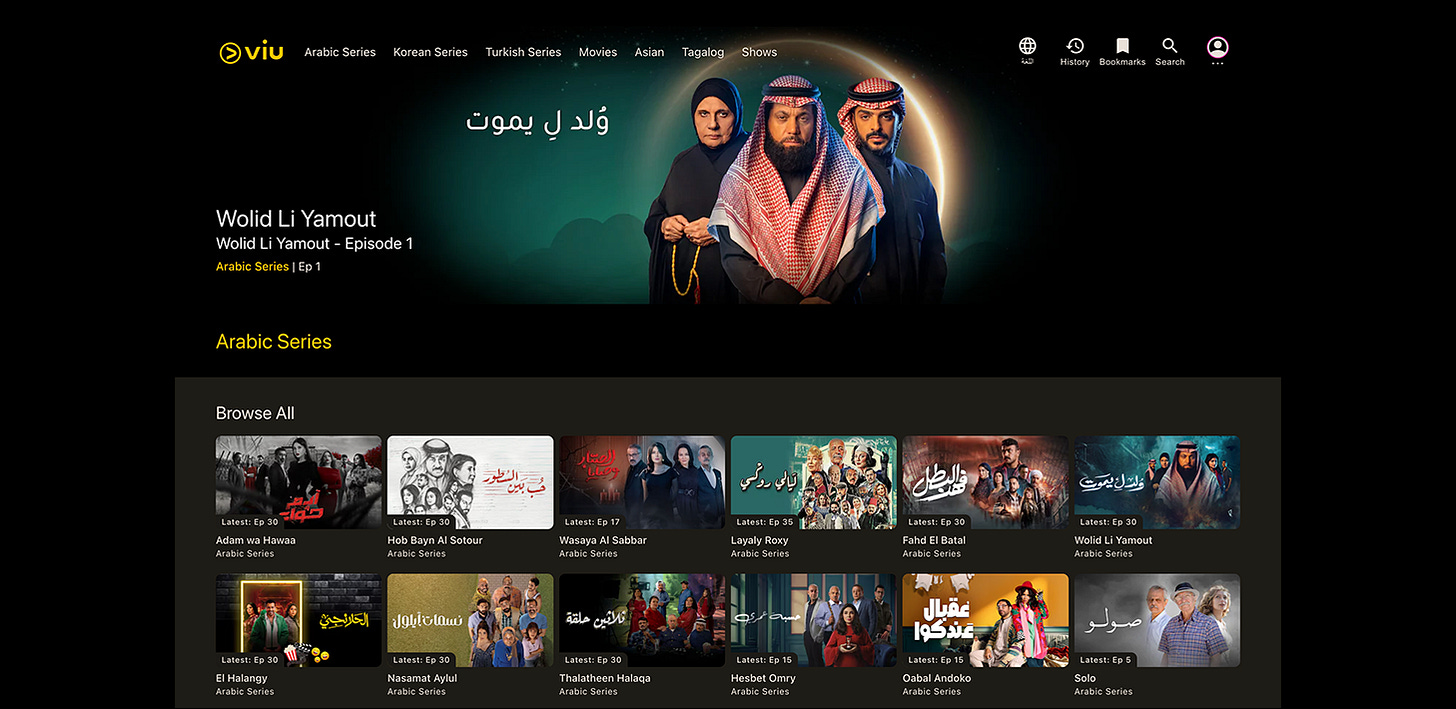🎯 Viu and the Power of Localization in Streaming
How this platform is building a local-first strategy in MENA
Hey streamers! Today, let’s talk about Viu and their smart localization strategy 🎯👇
I often group the MENA streaming market into two main categories: global players and local platforms.
At first, it’s easy to see Viu as a global player. It started in Hong Kong in 2015 and expanded to MENA in 2017.
But the more time I spend on the platform, the more I see it differently.
Here’s why I believe Viu has truly become a local platform in MENA 👇
Read on to learn about:
Viu’s global expansion: From Asia to MENA and new markets around the world.
Winning with localization: How Viu adapts its content for MENA audiences.
So What? Lessons from Viu that others should pay attention to.
Viu’s global expansion
Viu started in 2015 in Hong Kong, launched by PCCW, a major media and telecom company in Asia.
Since then, Viu has grown far beyond its home market.
Viu streaming service is available to consumers through a hybrid model, with an ad-supported free tier and a premium subscription tier.
In addition to premium original productions under the brand “Viu Original”, Viu's unique content offering consists of co-produced Turkish and Arabic content as well as a wide library of K-drama, dubbed in Arabic.
In June 2023, PCCW and CANAL+ formed a partnership to accelerate the growth of Viu, making CANAL+ a strategic investor in Viu.
The reach of Viu is already impressive with over 15.5 million subscribers and counting.
After launching in Hong Kong in 2015, they expanded into Singapore, India, Malaysia, Indonesia, Philippines and Thailand before entering the MENA region and South Africa in 2018.
Full details available here.
Now, let’s zoom in on MENA.
Viu entered the region in 2018 and set up an office in Dubai. Since then, the streaming service has focused on hiring people who know the local market well and understand what viewers in this region want.
From Dubai, Viu manages 16 markets in MENA, with special attention on big markets like UAE, Saudi Arabia and Egypt.
Initially, Viu offered content similar to what was available in other countries. However, over time, they shifted their approach by introducing more co-produced and original Arabic shows, along with expanded language options to better cater to local audiences.
If you check out Viu in the UAE, for example, you’ll find a mix of Arabic series, Korean dramas, Turkish shows, Asian content, and Tagalog series. This variety of both Asian and Arabic content makes Viu stand out with local audiences.
Next, let’s see how this strategy on local needs is helping Viu grow in MENA.
Winning with localization
What does “localization” really mean for a streaming service?
For most platforms, the first step is the language. Usually, that means adding Arabic subtitles and/or dubbing to international shows. It sounds basic but not all the platforms in the region localize their strategy this way.
Platforms can take it further by acquiring popular formats and creating local versions with regional production partners.
The top level is producing original content just for MENA: stories made for local audiences, often by local creators.
Not every platform can invest in all three levels. It takes time, money, strong regional network, and a real understanding of the market.
What stands out about Viu is that they’re active at every stage:
A large share of their library has Arabic subtitles or dubbing.
They regularly license and co-produce global hits from Turkish and Arabic content to Korean dramas, and make them accessible for MENA audiences
They also create original Arabic shows that reflect local culture.
Take their new reality show, The Big Bang Birthday, for example.
The show follows 4 popular content creators as they plan a birthday celebration for Hadeel Marei, a well-known Egyptian digital creator. The cast includes Amy Roko (Saudi Arabia), Dana Halabi (Syria/UAE), Jara (Saudi Arabia’s first female rapper), and Yussra Youssif (Sudan), all bringing their own unique backgrounds and voices.
More reality shows on Viu:
Another example is “We Wed” featuring social media stars Shero and Shahd, who have a combined 5M followers across their channels, in an exclusive episode from Viu Originals. Users can experience every moment of their special wedding day, filled with surprises, surrounded by family and close friends.
Those are a clear example of Viu investing in stories and personalities that really connect with viewers in Saudi, the UAE, and across the Arab World.
Localization in MENA isn’t just about content, it’s also about partnerships.
Each country in the region is different, especially when it comes to how people pay for streaming services. For example, credit card use isn’t as common everywhere. That’s why direct carrier billing (DCB), where users can pay through their mobile operator, and bundles are key for success in MENA.
Viu understood this early and now works with more than 20 telecom partners in the region, including du, e&, STC, Ooredoo, Orange, Inwi, Omantel, and others.
Here are a couple of recent partners:
Viu x Omantel: With the “Viu Gift Box”, new post-paid Omantel customers in Oman can upgrade to Viu Premium and enjoy free streaming data as part of their mobile plan.
Viu x stc tv: This partnership allows stc tv to offer Viu’s Turkish and Arabic series to their subscribers in KSA and GCC, while Viu adds top Arabic films from stc tv to its platform.
These partnerships help Viu reach more people across the MENA region.
So What?
Now that we’ve talked about Viu’s growth and focus on localization, let’s see what results they’re getting.
First, some numbers. In 2024, Viu was one of the top 3 most-downloaded streaming apps in MENA, according to Sensor Tower. That’s impressive!
Let’s look at Ramadan, which is the most important time of year for streaming in the region. During Ramadan this year, Viu’s viewership more than doubled compared to last year.
Their Egyptian series, Fahd El Batal, was the number one show across all Viu markets in MENA during March. Other popular titles like Nasamat Ayloul from the Levant and the Egyptian original Al Halanji were also big hits.



And this is just their Arabic series. Viu is unique because it serves both Arabic speakers and the large Asian community living in MENA.
For example, Viu was one of the first platforms to bring Korean content to MENA and make it available in Arabic. They now have the biggest library of Korean shows dubbed in Arabic in the region.
So, what’s the secret?
Viu’s success isn’t just about good content. It’s about making everything local: content, partnerships, marketing, etc. This helps Viu grow its audience, keep viewers engaged, and build a loyal community.
Another sign they’re doing well: CANAL+ invested $300 million in Viu, increasing their share in the company. This big investment from a global media company shows that Viu’s strategy is working, and people are noticing their growth in Asia and MENA.
For me, Viu’s success shows just how important localization is in streaming. That’s also why I wouldn’t be surprised to see Viu launch in more countries using the same strategy.
Wishing everyone a great week! See you online this Friday for a new edition of my Streaming in Short.










